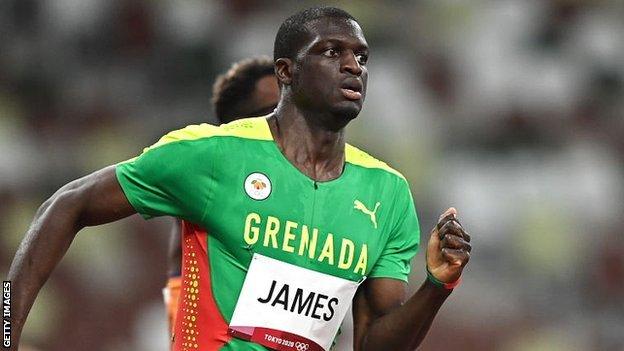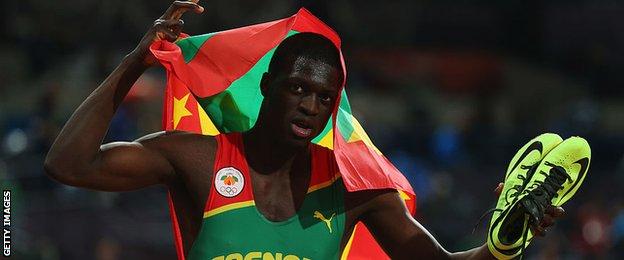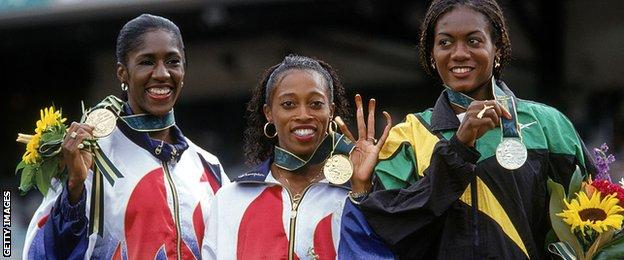Tokyo Olympics: Kirani James on gold, blood and home
Last updated on .From the section Olympics

| Tokyo Olympic Games on the BBC |
|---|
| Dates: 23 July-8 August Time in Tokyo: BST +8 |
| Coverage: Watch live on BBC TV, BBC iPlayer, BBC Red Button and online; Listen on BBC Radio 5 Live, Sports Extra and Sounds; live text and video clips on BBC Sport website and app. |
Kirani James knows an Olympic gold doesn't just change a life. It can do much more than that.
"It had a ripple effect on my home country," he tells BBC Sport. "It gave Grenada more recognition. People were looking up where Grenada is and finding out more about it, it was a boost in tourism and things like that.
"It was a change, but not just for me."
James got the first inkling when he emerged through the doors of Maurice Bishop airport on a warm August evening. Then 19, he already had a street named after him in the island's capital St George following his world 400m win a year before.
But his London 2012 win, Grenada's first Olympic medal of any colour, was of a different magnitude.
James emerged from the arrivals hall with a sheepish smile. In front of him a sea of faces, flags and a booming public address system announcing the homecoming of 'King James'. The prime minister had already announced a public holiday in his honour.
Four years later, Grenada had its second Olympic medal. And so did James, as he took silver behind world record-setting Wayde van Niekerk in Rio.
The build-up to Tokyo though has been the longest, hardest Olympic campaign yet for the 28-year-old.
Eight months after Rio, James finished sixth in a high-profile American college event. His time was more than two seconds slower than the meeting record he had set the year before.
In fact, it was his slowest time in a 400m final since he was 16.
"You push your body through a lot of things as an athlete," he remembers.
"Sometimes you feel a little more fatigued than usual, that happens.

"I didn't notice but I was losing weight as well, feeling hungry, wasn't sleeping as I should.
"Even then I was able to go through it, but when competition comes, it is a whole different experience."
His time, defeat and slow recovery convinced him to have blood tests.
The results revealed he had Graves' disease, an auto-immune condition leading to an over-active thyroid and an over-tired athlete.
He spent more than a year out of the sport after his diagnosis, tweaking medication and getting advice on how to manage the condition alongside his training workload.
One of those, he turned to was Gail Devers. Devers suffered more severely with Graves' disease. Her skin peeled, hair shedded and, at one point, she feared she would lose her feet after a blister turned septic.
However the American recovered to win 100m gold at Barcelona 1992 and Atlanta 1996, competing across five Olympic Games in total.
"I have spoken to her the phone one time to relate my experience," James says.
"I am looking forward to sitting down at some point, and talking in more detail about it and if there is another young athlete who has that same experience I would be more than happy to talk to them too."

Treatment has moved on. Devers had to drink radioactive iodine solution in an attempt to kill off the gland. James instead takes daily tablets, precisely cut into fractions to adjust his hormone level back into a normal range.
But their recovery took similarly long. Two and a half years, but only six races, since diagnosis, James came fifth in the World Championships in Doha in 2019.
On Monday, he was the fastest man into Thursday's Tokyo Olympic final (13:00 BST).
"It would be perfect to get a third," he says, on the prospect of another Olympic medal.
"But I have a different perspective now to before. It is a privilege to be in the sport and be doing something I am good at and love.
"I am just going to try and enjoy it as much as I can, to have that kind of feeling of representing my country, the relationship with fellow competitors... that is what's important.
"Sports always brings everyone together regardless of where you are from and what you have been through. There is that kind of commonality."
And whatever happens, whatever the reception, James will return to Gouyave, his small fishing hometown, as a hero.
Covid restrictions and difficulties have kept James, based in Arizona, away since December 2019.
"People there have known me since I was a child," he says. "I am like an extension of their family.
"Sometimes they want to express their pride and excitement but most of the time it is calm and we sit about and talk.
"It replenishes me going back home.
"Things slow down and you can take everything in. It is like a pilgrimage, you go back and see everyone and your roots. It helps keep me grounded and focused on the right things.
- Day-by-day guide to the Games
- Times and channels for BBC's live coverage
- Listen to the latest Olympics Daily podcast
- Tokyo 2020 medal table

- 'In my eyes, anyone can be an influencer': Is social media a viable full-time career at 16?
- Jerk: Hilarious comedy starring the 'unsackable' Tim Renkow




























